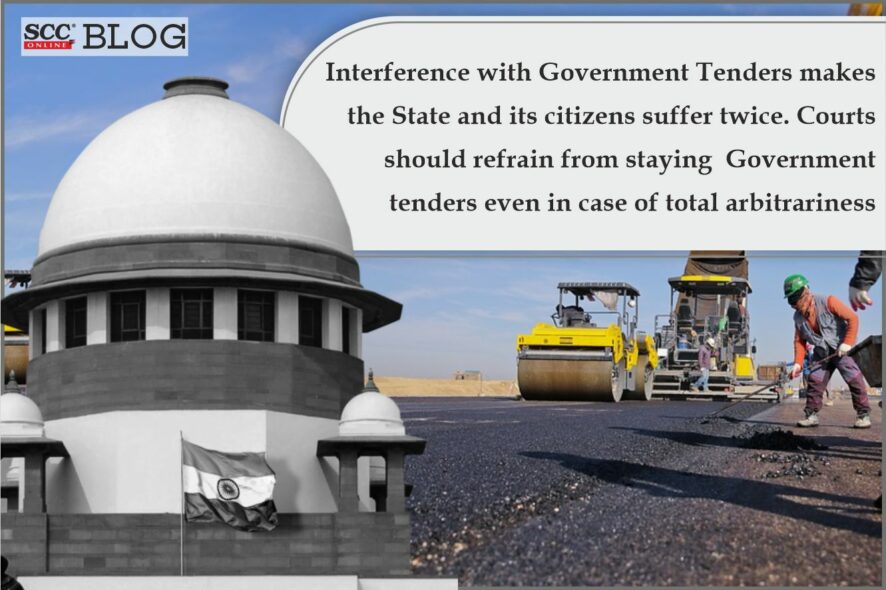Supreme Court: Explaining the scope of interference in matters relating to Government contracts and tenders, the bench of Hemant Gupta* and V. Ramasubramanian, JJ has held that even if the Court finds that there is total arbitrariness or that the tender has been granted in a malafide manner, still the Court should refrain from interfering in the grant of tender but instead relegate the parties to seek damages for the wrongful exclusion rather than to injunct the execution of the contract.
The matter dealt with the construction of the Nagaruntari – Dhurki – Ambakhoriya road in the State of Jharkhand. When issue arose, the High Court of Jharkhand stayed the construction of the Road. On this the Supreme Court observed that since the construction of road is an infrastructure project and keeping in view the intent of the legislature that infrastructure projects should not be stayed, the High Court would have been well advised to hold its hand to stay the construction of the infrastructure project. Such provision should be kept in view even by the Writ Court while exercising its jurisdiction under Article 226 of the Constitution of India.
It said,
“The Writ Court should refrain itself from imposing its decision over the decision of the employer as to whether or not to accept the bid of a tenderer. The Court does not have the expertise to examine the terms and conditions of the present day economic activities of the State and this limitation should be kept in view. Courts should be even more reluctant in interfering with contracts involving technical issues as there is a requirement of the necessary expertise to adjudicate upon such issues. The approach of the Court should be not to find fault with magnifying glass in its hands, rather the Court should examine as to whether the decision-making process is after complying with the procedure contemplated by the tender conditions. If the Court finds that there is total arbitrariness or that the tender has been granted in a malafide manner, still the Court should refrain from interfering in the grant of tender but instead relegate the parties to seek damages for the wrongful exclusion rather than to injunct the execution of the contract. The injunction or interference in the tender leads to additional costs on the State and is also against public interest. Therefore, the State and its citizens suffer twice, firstly by paying escalation costs and secondly, by being deprived of the infrastructure for which the present-day Governments are expected to work.”
In the case at hand, the State has paid over a sum of Rs.3,98,52,396/- to the appellant till date, though the stand of the appellant is that it had submitted bills of work of Rs.8.5 crores. The termination of contract would cause additional financial burden on the State and also deprive the amenity of road for a longer period.
The Court was of the opinion that the action of the respondent in setting aside the letter of acceptance granted to the appellant suffered from manifest illegality and cannot be sustained and consequently, the State was directed to allow the appellant to resume and complete the work by excluding the period spent in the stay of execution of the contract.
Mentioning a word of caution, the Court said that any contract of public service should not be interfered with lightly and in any case, there should not be any interim order derailing the entire process of the services meant for larger public good.
“The grant of interim injunction by the learned Single Bench of the High Court has helped no-one except a contractor who lost a contract bid and has only caused loss to the State with no corresponding gain to anyone.”
The Court also observed that multiple layers of exercise of jurisdiction also delay the final adjudication challenging the grant of tender. Therefore, it would be open to the High Courts or the Hon’ble Chief Justice to entrust these petitions to a Division Bench of the High Court, which would avoid at least hearing by one of the forums.
[NG Projects Ltd. V. Vinod Kumar Jain, 2022 SCC OnLine SC 336, decided on 21.03.2022]
*Judgment by: Justice Hemant Gupta







